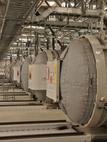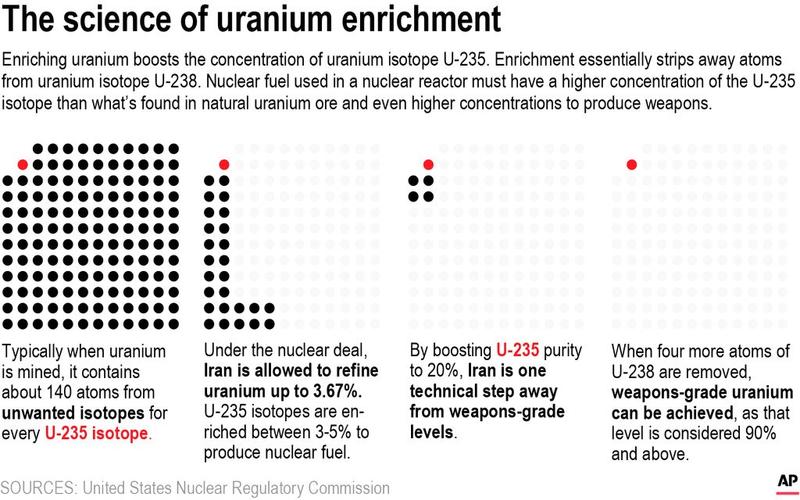 A file handout picture released by Iran's Atomic Energy Organization on November 6, 2019, shows the interior of the Fordow Uranium Conversion Facility in Qom, in the north of the country. (ATOMIC ENERGY ORGANIZATION OF IRAN/AFP)
A file handout picture released by Iran's Atomic Energy Organization on November 6, 2019, shows the interior of the Fordow Uranium Conversion Facility in Qom, in the north of the country. (ATOMIC ENERGY ORGANIZATION OF IRAN/AFP)
WASHINGTON - The United States on Monday called Iran's decision of enriching uranium to the 20 percent level at its Fordow facility as "nuclear extortion."
"Iran enriching uranium to 20 percent at Fordow is a clear attempt to increase its campaign of nuclear extortion, an attempt that will continue to fail," a State Department spokesperson said in a statement.
READ MORE: Tanker: Seoul 'making diplomatic efforts', Tehran stresses procedure
"The United States and the international community will continue to look to IAEA (International Atomic Energy Agency) inspectors to report the facts on the ground," it added.
The Atomic Energy Organization of Iran (AEOI) announced late on Monday that the 20-percent enriched uranium had started at its Fordow facility and had reached the stability level.
Iran enriching uranium to 20 percent at Fordow is a clear attempt to increase its campaign of nuclear extortion, an attempt that will continue to fail.
US State Department spokesperson
According to AEOI spokesman Behrouz Kamalvandi, the 20-percent uranium enrichment process was launched on Monday as part of Iran's Strategic Action Plan to Counter Sanctions, which was approved by the parliament in December 2020.
Iranian Foreign Minister Mohammad Javad Zarif tweeted on Monday that Iran's action "conforms fully with Para 36 of JCPOA, after years of non-compliance by several other JCPOA participants. Our measures are fully reversible upon FULL compliance by ALL."
ALSO READ: Iran starts producing 20% enriched uranium
The latest move came amid increasing tension between Washington and Tehran. The Pentagon said late Sunday that US aircraft carrier USS Nimitz would remain in the Middle East waters due to "threats from Iran," reversing a previous decision to order the warship back home.

In May 2018, US President Donald Trump pulled his country out of the Iranian nuclear deal, also known as the Joint Comprehensive Plan of Action (JCPOA), and reimposed harsh sanctions against Iran. In response, Tehran has gradually stepped back from some of its JCPOA commitments since May 2019.
The Iranian Foreign Ministry said Iran has never negotiated its own defense capabilities and will never do so, semi-official news agency Fars reported
Israel on Monday urged the international community to take "a determined response" against Iran, with its Foreign Ministry saying that Tehran's announcement of the resumption of 20-percent uranium enrichment "should serve as a wake-up call for advocates of a peaceful approach to Iran."
Japan’s top government spokesman on Tuesday said the country was deeply concerned about Iran’s latest announcement of a resumption of 20-percent uranium enrichment.
“The government has strong concerns about this move, which is a breach of a nuclear agreement,” Chief Cabinet Secretary Katsunobu Kato told reporters.
Meanwhile, the Iranian Foreign Ministry said on Monday that Iran has never negotiated its own defense capabilities and will never do so, semi-official news agency Fars reported.
As for Iran's defense capabilities, there has never been and will never be any negotiation, Saeed Khatibzadeh, the ministry spokesman, said at a weekly press briefing held in the capital Tehran.
The spokesman's statement came a day after Jake Sullivan, national security advisor-designate for US President-elect Joe Biden, said Iran's missile program "has to be on the table" in follow-on negotiations, provided Washington re-enters the 2015 nuclear agreement.
The question of Iran's missiles is mentioned in the JCPOA as well as in the UN Security Council Resolution 2231 endorsing the agreement, said Khatibzadeh, commenting on Sullivan's remarks.
The question is "settled," he added.
The US government actually "knows" that Iran's nuclear activities are of peaceful nature, the spokesman noted.
With Reuters inputs



